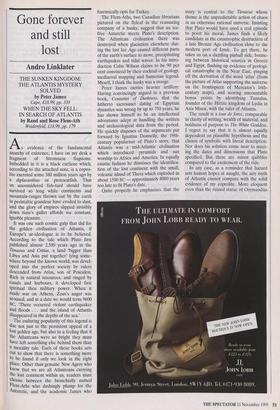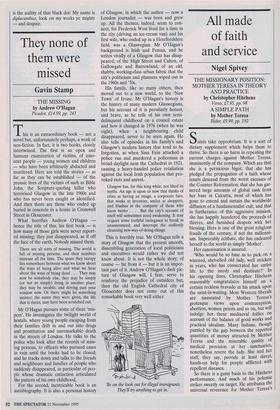Gone forever and still lost
Andro Linklater
THE SUNKEN KINGDOM: THE ATLANTIS MYSTERY SOLVED by Peter James Cape, £18.99, pp. 338 WHEN THE SKY FELL: IN SEARCH OF ATLANTIS by Rand and Rose Flem-Ath Weidenfeld, £18.99, pp. 179 As evidence of the fundamental anarchy of existence, I have on my desk a fragment of Stromness flagstone. Imbedded in it is a black curlicue which, according to the attached note, is a copro- lite excreted some 380 million years ago by a diplacanthus or protocatfish. That an unconsidered fish-turd should have survived so long while continents and mountain-ranges thrown out by the earth in peristaltic grandeur have eroded to dust, and the glory of empires slipped invisibly down time's gullet affords me constant, ignoble pleasure.
It was one such cosmic gulp that did for the golden civilisation of Atlantis, if Europe's ur-ideologue is to be believed. According to the tale which Plato first published almost 2,500 years ago in the Timaeus and Critias, a land 'bigger than Libya and Asia put together' lying some- where beyond the known world, was devel- oped into the perfect society by rulers descended from Atlas, son of Poseidon. Rich in natural resources, and ringed by canals and harbours, it developed first spiritual then military power. When it made war on Athens, Zeus's anger was aroused, and at a date we would term 9600 BC, 'There occurred violent earthquakes and floods . . . and the island of Atlantis disappeared in the depths of the sea.'
The enduring popularity of this legend is due not just to the persistent appeal of a lost golden age, but also to a feeling that if the Atlanteans were so bright they must have left something else behind them than a morality tale. Each of these books sets out to show that there is something more to be found if only we look in the right place. Other than genuine New Agers who know that we are all Atlanteans carrying the lost continent within us, readers must choose between the bronchially named Flem-Aths who dashingly plump for the Antarctic, and the academic James who forensically opts for Turkey.
The Flem-Aths, two Canadian librarians pictured on the flyleaf in the reassuring company of a husky, suggest that an ice- free Antarctic meets Plato's description. The Atlantean civilisation there was destroyed when glaciation elsewhere dur- ing the last Ice Age caused different parts of the earth's surface to move, precipitating earthquakes and tidal waves. In his intro- duction Colin Wilson claims to be 90 per cent convinced by their cocktail of geology, mediaeval mapping and Sumerian legend. Myself, I think the husky was a stooge. Peter James carries heavier artillery. Having convincingly argued in a previous book, Centuries of Darkness, that the hitherto sacrosanct dating of Egyptian dynasties was wrong by up to 750 years, he has shown himself to be an intellectual adventurer adept at handling the written and archaeological data from the period. He quickly disposes of the arguments put forward by Ignatius Donnelly, the 19th- century populariser of Plato's story, that Atlantis was a mid-Atlantic civilisation which introduced pyramids and sun worship to Africa and America. In equally caustic fashion he dismisses the identifica- tion of the lost continent with the small, volcanic island of Thera which exploded in about 1500 BC — approximately 8000 years too late to fit Plato's date.
Quite properly he emphasises that the story is central to the Timaeus whose theme is the unpredictable action of chaos in an otherwise rational universe. Insisting that Plato would have used a real episode to point his moral, James finds a likely candidate in the catastrophic destruction of a late Bronze Age civilisation close to the modern port of Izmir. To get there, he takes us on a dazzling pinball ride, bounc- ing between historical sources in Greece and Egypt, flashing up evidence of geologi- cal catastrophe in the Near East, pinging off the derivation of the word 'atlas' (from the picture of Atlas supporting the universe on the frontispiece of Mercator's 16th- century maps), and scoring uncountable bonus points by identifying Tantalus, founder of the Hittite kingdom of Lydia in Asia Minor, with the ruler of Atlantis.
The result is a tour de force, comparable in clarity of writing, wealth of material, and boldness of purpose to The White Goddess. I regret to say that it is almost equally dependent on plausible hypothesis and the elision of symbolic with literal description. Nor does his solution come near to meet- ing the dates and dimensions that Plato specified. But these are minor quibbles compared to the excitement of the ride.
In any case, as a reminder that hazard sets human hopes at naught, the airy myth of Atlantis cannot compare with the solid evidence of my coprolite. More eloquent even than the ruined statue of Ozymandias is the nullity of that black dot: My name is diplacanthus, look on my works ye mighty — and despair.



















































































 Previous page
Previous page